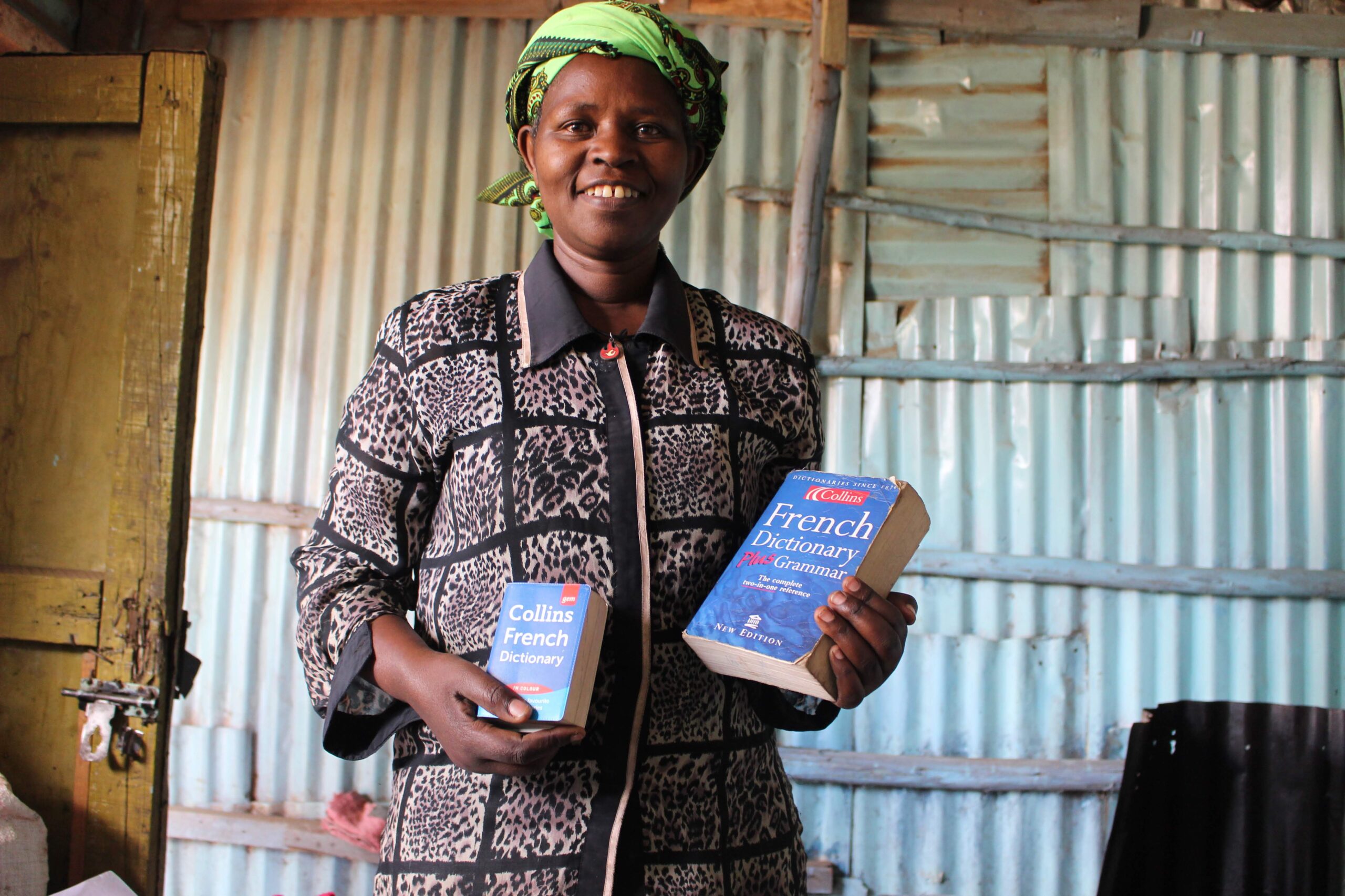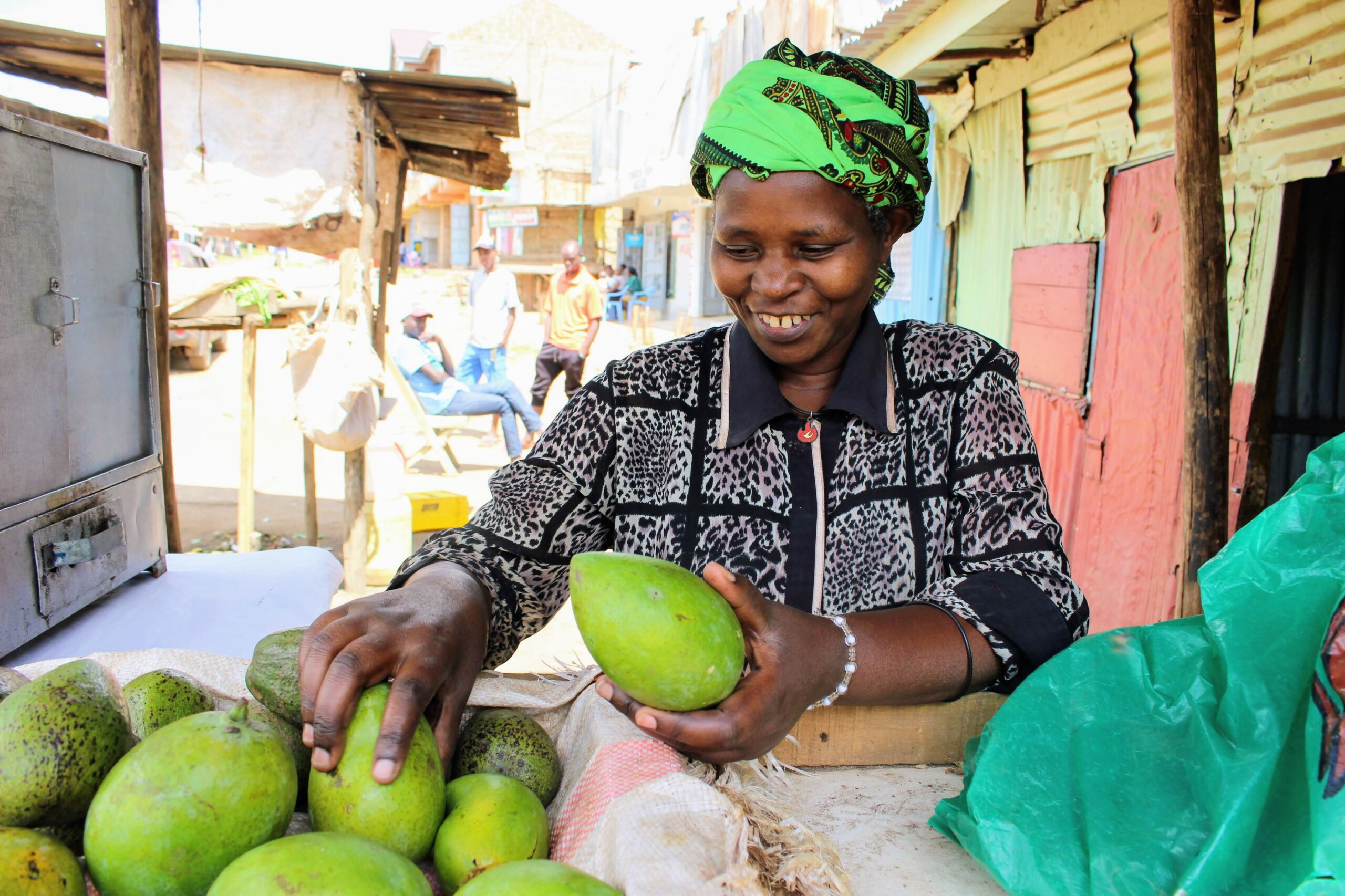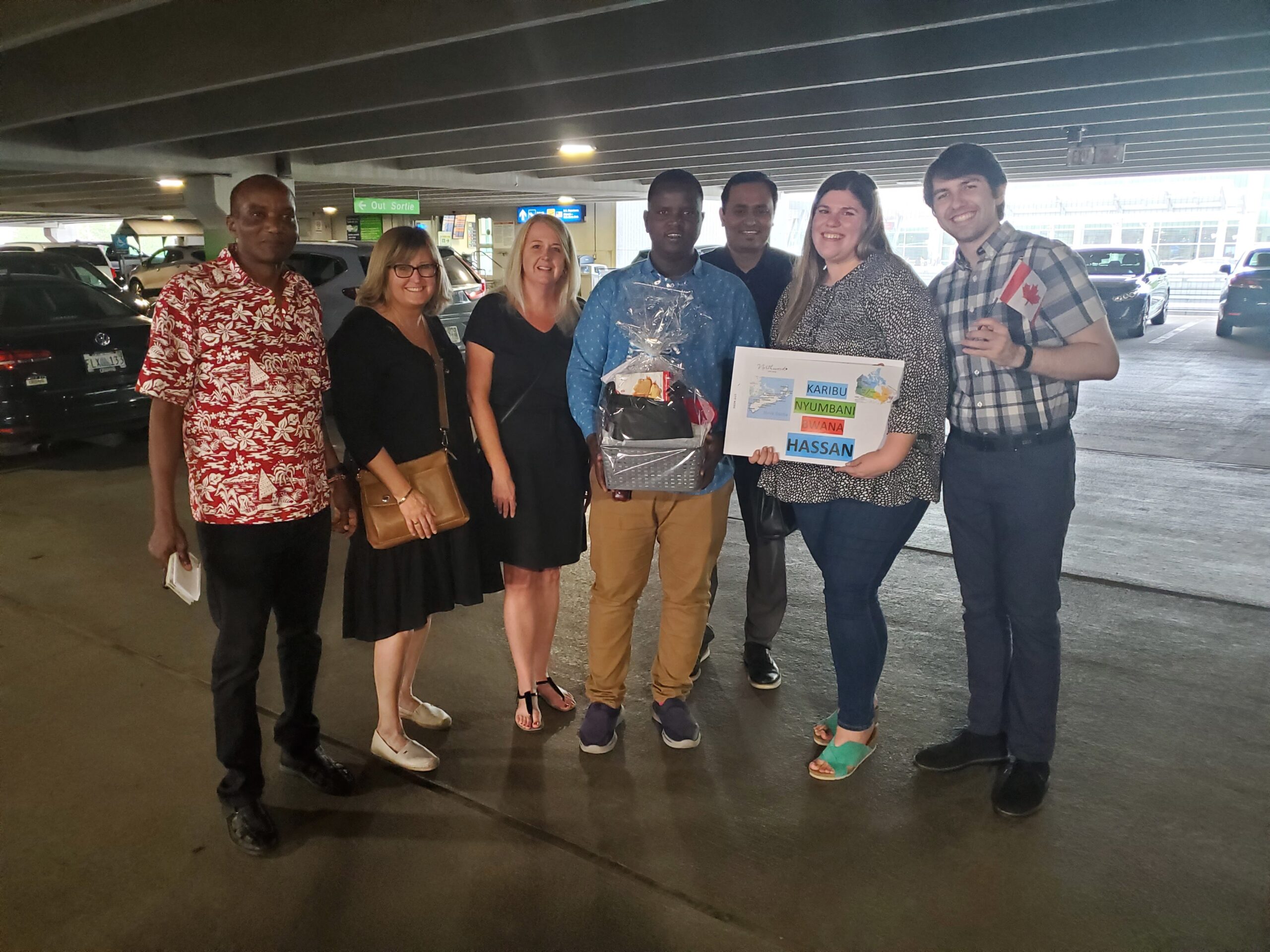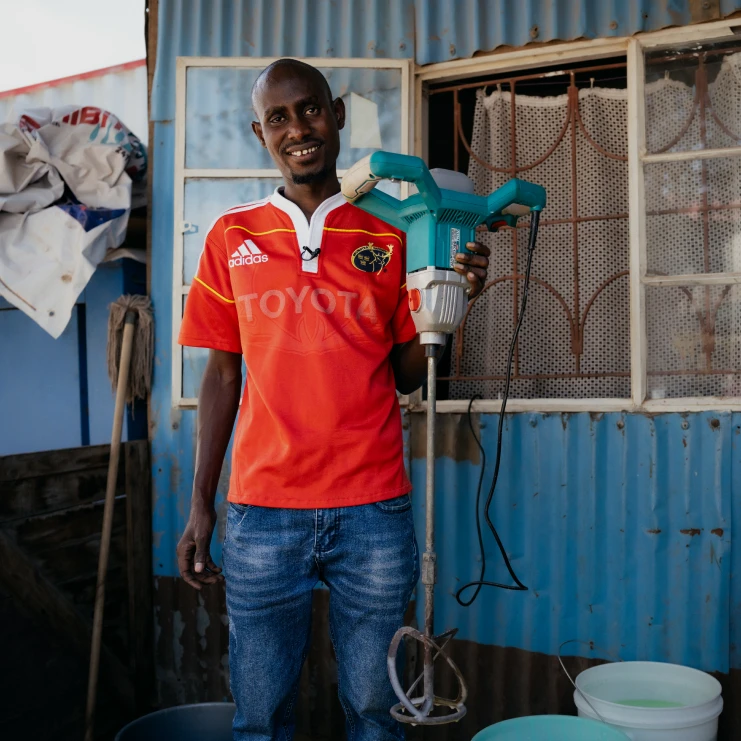
Welcoming Little Amal to Boston
From September 7-9, Boston, the home of RefugePoint’s headquarters, will be welcoming a very special guest named Little Amal. Little Amal, whose name means “hope” in Arabic, is a 12-foot puppet that symbolizes a 10-year-old Syrian refugee girl in search of her mother. Little Amal has traveled to more than a dozen countries and has met more than one million people to raise awareness about the plight of refugee children. Boston is the first stop on Little Amal’s 6,000-mile journey across the United States. For a schedule of Little Amal’s events across the U.S., click here.
How does RefugePoint support refugee children like Little Amal?
RefugePoint has Child Protection Experts working throughout Africa, the Middle East, and across the world. Some of our Child Protection Experts work directly with Syrian refugee children, like Little Amal. One of our Experts in the Middle East, for example, recently facilitated the reunification of a 12-year-old Syrian girl named Aya*, with her father after 10 years of separation.
Aya, who was born in 2010, was just two years old when her mother died. That same year, her father was forced to flee from Syria due to the war. Throughout her childhood, Aya lived with various aunts and uncles. In 2014, she and her aunt fled to a nearby country to escape the war. While she was in touch with her dad, the war kept them separated.
In 2019, Aya’s father approached UNHCR and requested to be reunited with Aya. RefugePoint’s Expert worked on the Best Interest Determination for Aya and determined that reuniting Aya with her father was in her best interest. The Expert then coordinated the reunification process by bringing the case to the attention of the different relevant stakeholders, following up on the actions of different actors, and communicating with counterparts in his host country. As a result of the great collaboration and advocacy for the child in multiple countries, Aya and her father were successfully reunited. The two are finally living together in safety.
As you can see, it takes a lot of work to reunite a child with her parents. The strong coordination, persistence, and collaboration among colleagues involved made this reunification a success. RefugePoint worked diligently to ensure that Aya would be able to travel, coordinating with UNHCR colleagues, government officials, and other organizations.
Family separation can be devastating and have far-reaching negative impacts on children’s mental and psychological well-being. Protecting unaccompanied children and reuniting them with family members when possible is a core focus of RefugePoint.
*name changed for protection
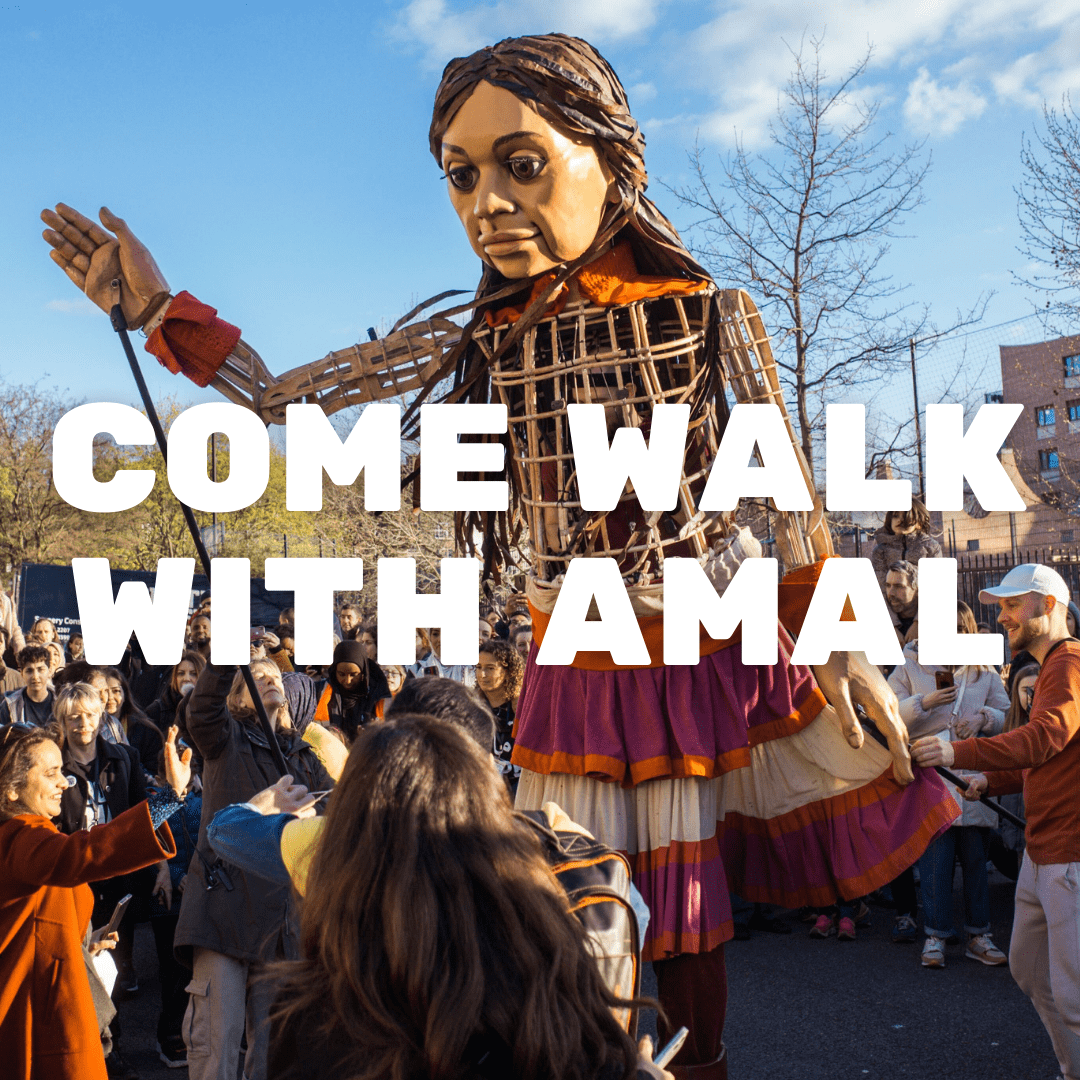
How does Little Amal’s visit relate to RefugePoint?
RefugePoint identifies refugees around the world who can’t stay safely where they are for resettlement to the US, Canada, Australia, and many other countries. Among the estimated two million refugees in need of resettlement are tens of thousands of children separated from their parents and other family members.
These children are either under the care of other adults, or they are unaccompanied, without any caretakers. Resettlement options include resettling them along with their caretakers when possible, reuniting them with parents and other surviving family members if this is an option, or, for those who are unaccompanied or orphaned, supporting them to resettle to a country that has a foster care system in place for refugee minors, such as the U.S.
In all cases, specialized work and expertise is needed to help them in the resettlement process, including following Best Interests Procedures – a case management framework for children – and conducting Best Interests Determinations, and resettlement interviews.
There is, however, a significant lack of resources and expertise to do this work. This critical child protection gap exists despite the fact that minors separated from their parents are among the most at-risk refugees, and family unity and the rights of children are enshrined in the Universal Declaration of Human Rights, the Convention on the Rights of the Child, and elsewhere.
RefugePoint is a global leader in this specific arena of protecting unaccompanied refugee children. We work across Africa, the Middle East, and around the world to help refugee children in the following ways:
1) Reuniting children with parents and other surviving family members.
2) Supporting children under the care of another family to resettle with that family.
3) Helping orphaned children to resettle to a country with an appropriate care system in place.
4) Training and supporting other organizations to do similar work.
5) Building more effective humanitarian systems to protect unaccompanied and separated children.
What types of support do refugee children like Little Amal need?
Often, refugee families become separated during war and flight and many refugees may never see their family members again. Among them, there are tens of thousands of children separated from their parents and other family members, just like Little Amal. When children are separated from their families and support systems, they are left unprotected and susceptible to abuse and exploitation and lack access to schooling and other basic rights.
Family unity is a basic human right, and we strive to reunite refugee families no matter where they are located. RefugePoint Family Reunification staff:
- Identify unaccompanied children with relatives abroad.
- Complete best interest assessments/determinations to assess the minor’s situation, determine the best way forward, and provide case management and referrals to partners for legal services or other needs.
- Assist the child in navigating the immigration process to the point of departure.
RefugePoint’s Family Reunification Experts also develop the tools, systems, and structures necessary to institutionalize family reunification in countries of asylum, and provide training and capacity-building to other organizations to expand access.
RefugePoint’s impact
RefugePoint has directly helped more than 119,745 refugees to access resettlement; supported 18,353 children through Best Interest Procedures and Best Interest Assessments and reviews to support their resettlement and family reunions; and trained over 11,179 UNHCR, government, and NGO staff on resettlement, child protection, and family reunion activities.
Recently, RefugePoint Child Protection Experts have helped unaccompanied Syrian children, like Amal, in Egypt, Iraq, Libya, Turkey, and the United Arab Emirates.

Follow along as we walk with Little Amal in Boston
Join RefugePoint in welcoming Little Amal to Boston on Thursday, September 7 at 4:00pm as she begins her walk in Dewey Square.
For real-time updates, be sure to follow us on Instagram as we walk with Little Amal throughout her Boston tour.
Want to learn more about our work supporting unaccompanied and separated children? Check out these resources:
1) Watch this 60 Minutes piece about the resettlement to the US of a group of unaccompanied children known as the Sudanese Lost Boys. A Hollywood film was later made about them called The Good Lie.
2) Watch this 20-second reel of a Congolese mother whom RefugePoint helped to reunite with her children and husband.
3) Watch this 30-second reel for International Day of the Girl Child about an unaccompanied Rwandan refugee minor who came to the US and built her life here and is now on RefugePoint’s board.
4) Read this op ed about reuniting unaccompanied children with their parents which highlights RefugePoint’s work to help a Yazidi child reunite with his mother in Canada and the global need to reunite children with parents.
5) Read this op ed about the importance of reuniting Ukrainian children with their parents based on RefugePoint’s global work to support family reunion efforts.
6) Donate: Join RefugePoint’s community of supporters who help us deliver life-saving solutions for refugees and help them to build secure, new lives.
Amal Walks Across America is produced by The Walk Productions in association with Handspring Puppet Company.

Welcoming Little Amal to Boston
From September 7-9, Boston, the home of RefugePoint’s headquarters, will be welcoming a very special guest named Little Amal. Little Amal, whose name means “hope” in Arabic, is a 12-foot puppet that symbolizes a 10-year-old Syrian refugee girl in search of her mother. Little Amal has traveled to more than a dozen countries and has met more than one million people to raise awareness about the plight of refugee children. Boston is the first stop on Little Amal’s 6,000-mile journey across the United States. For a schedule of Little Amal’s events across the U.S., click here.
How does RefugePoint support refugee children like Little Amal?
RefugePoint has Child Protection Experts working throughout Africa, the Middle East, and across the world. Some of our Child Protection Experts work directly with Syrian refugee children, like Little Amal. One of our Experts in the Middle East, for example, recently facilitated the reunification of a 12-year-old Syrian girl named Aya*, with her father after 10 years of separation.
Aya, who was born in 2010, was just two years old when her mother died. That same year, her father was forced to flee from Syria due to the war. Throughout her childhood, Aya lived with various aunts and uncles. In 2014, she and her aunt fled to a nearby country to escape the war. While she was in touch with her dad, the war kept them separated.
In 2019, Aya’s father approached UNHCR and requested to be reunited with Aya. RefugePoint’s Expert worked on the Best Interest Determination for Aya and determined that reuniting Aya with her father was in her best interest. The Expert then coordinated the reunification process by bringing the case to the attention of the different relevant stakeholders, following up on the actions of different actors, and communicating with counterparts in his host country. As a result of the great collaboration and advocacy for the child in multiple countries, Aya and her father were successfully reunited. The two are finally living together in safety.
As you can see, it takes a lot of work to reunite a child with her parents. The strong coordination, persistence, and collaboration among colleagues involved made this reunification a success. RefugePoint worked diligently to ensure that Aya would be able to travel, coordinating with UNHCR colleagues, government officials, and other organizations.
Family separation can be devastating and have far-reaching negative impacts on children’s mental and psychological well-being. Protecting unaccompanied children and reuniting them with family members when possible is a core focus of RefugePoint.
*name changed for protection

How does Little Amal’s visit relate to RefugePoint?
RefugePoint identifies refugees around the world who can’t stay safely where they are for resettlement to the US, Canada, Australia, and many other countries. Among the estimated two million refugees in need of resettlement are tens of thousands of children separated from their parents and other family members.
These children are either under the care of other adults, or they are unaccompanied, without any caretakers. Resettlement options include resettling them along with their caretakers when possible, reuniting them with parents and other surviving family members if this is an option, or, for those who are unaccompanied or orphaned, supporting them to resettle to a country that has a foster care system in place for refugee minors, such as the U.S.
In all cases, specialized work and expertise is needed to help them in the resettlement process, including following Best Interests Procedures – a case management framework for children – and conducting Best Interests Determinations, and resettlement interviews.
There is, however, a significant lack of resources and expertise to do this work. This critical child protection gap exists despite the fact that minors separated from their parents are among the most at-risk refugees, and family unity and the rights of children are enshrined in the Universal Declaration of Human Rights, the Convention on the Rights of the Child, and elsewhere.
RefugePoint is a global leader in this specific arena of protecting unaccompanied refugee children. We work across Africa, the Middle East, and around the world to help refugee children in the following ways:
1) Reuniting children with parents and other surviving family members.
2) Supporting children under the care of another family to resettle with that family.
3) Helping orphaned children to resettle to a country with an appropriate care system in place.
4) Training and supporting other organizations to do similar work.
5) Building more effective humanitarian systems to protect unaccompanied and separated children.
What types of support do refugee children like Little Amal need?
Often, refugee families become separated during war and flight and many refugees may never see their family members again. Among them, there are tens of thousands of children separated from their parents and other family members, just like Little Amal. When children are separated from their families and support systems, they are left unprotected and susceptible to abuse and exploitation and lack access to schooling and other basic rights.
Family unity is a basic human right, and we strive to reunite refugee families no matter where they are located. RefugePoint Family Reunification staff:
- Identify unaccompanied children with relatives abroad.
- Complete best interest assessments/determinations to assess the minor’s situation, determine the best way forward, and provide case management and referrals to partners for legal services or other needs.
- Assist the child in navigating the immigration process to the point of departure.
RefugePoint’s Family Reunification Experts also develop the tools, systems, and structures necessary to institutionalize family reunification in countries of asylum, and provide training and capacity-building to other organizations to expand access.
RefugePoint’s impact
RefugePoint has directly helped more than 119,745 refugees to access resettlement; supported 18,353 children through Best Interest Procedures and Best Interest Assessments and reviews to support their resettlement and family reunions; and trained over 11,179 UNHCR, government, and NGO staff on resettlement, child protection, and family reunion activities.
Recently, RefugePoint Child Protection Experts have helped unaccompanied Syrian children, like Amal, in Egypt, Iraq, Libya, Turkey, and the United Arab Emirates.

Follow along as we walk with Little Amal in Boston
Join RefugePoint in welcoming Little Amal to Boston on Thursday, September 7 at 4:00pm as she begins her walk in Dewey Square.
For real-time updates, be sure to follow us on Instagram as we walk with Little Amal throughout her Boston tour.
Want to learn more about our work supporting unaccompanied and separated children? Check out these resources:
1) Watch this 60 Minutes piece about the resettlement to the US of a group of unaccompanied children known as the Sudanese Lost Boys. A Hollywood film was later made about them called The Good Lie.
2) Watch this 20-second reel of a Congolese mother whom RefugePoint helped to reunite with her children and husband.
3) Watch this 30-second reel for International Day of the Girl Child about an unaccompanied Rwandan refugee minor who came to the US and built her life here and is now on RefugePoint’s board.
4) Read this op ed about reuniting unaccompanied children with their parents which highlights RefugePoint’s work to help a Yazidi child reunite with his mother in Canada and the global need to reunite children with parents.
5) Read this op ed about the importance of reuniting Ukrainian children with their parents based on RefugePoint’s global work to support family reunion efforts.
6) Donate: Join RefugePoint’s community of supporters who help us deliver life-saving solutions for refugees and help them to build secure, new lives.
Amal Walks Across America is produced by The Walk Productions in association with Handspring Puppet Company.

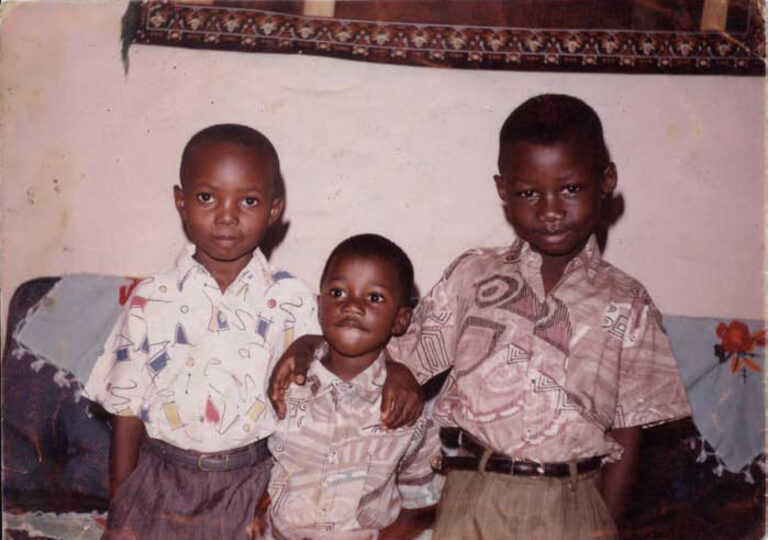
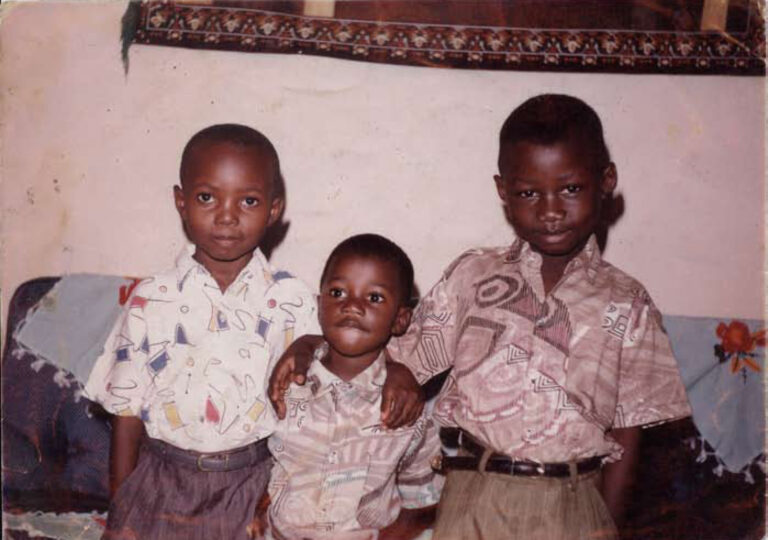 Philip, John, and Pierre walked over 300 miles alone through the jungle in search of safety.
Philip, John, and Pierre walked over 300 miles alone through the jungle in search of safety.
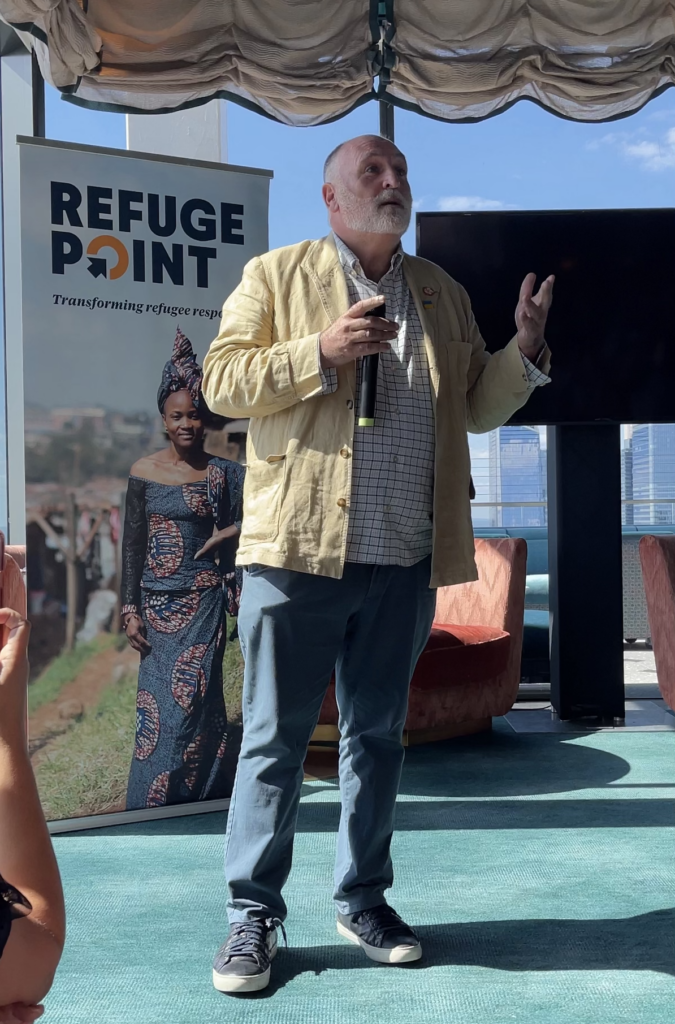 Chef José Andrés, Founder of World Central Kitchen, gave remarks at the event on September 20. Photo credit: Alison Pappavaselio, RefugePoint
Chef José Andrés, Founder of World Central Kitchen, gave remarks at the event on September 20. Photo credit: Alison Pappavaselio, RefugePoint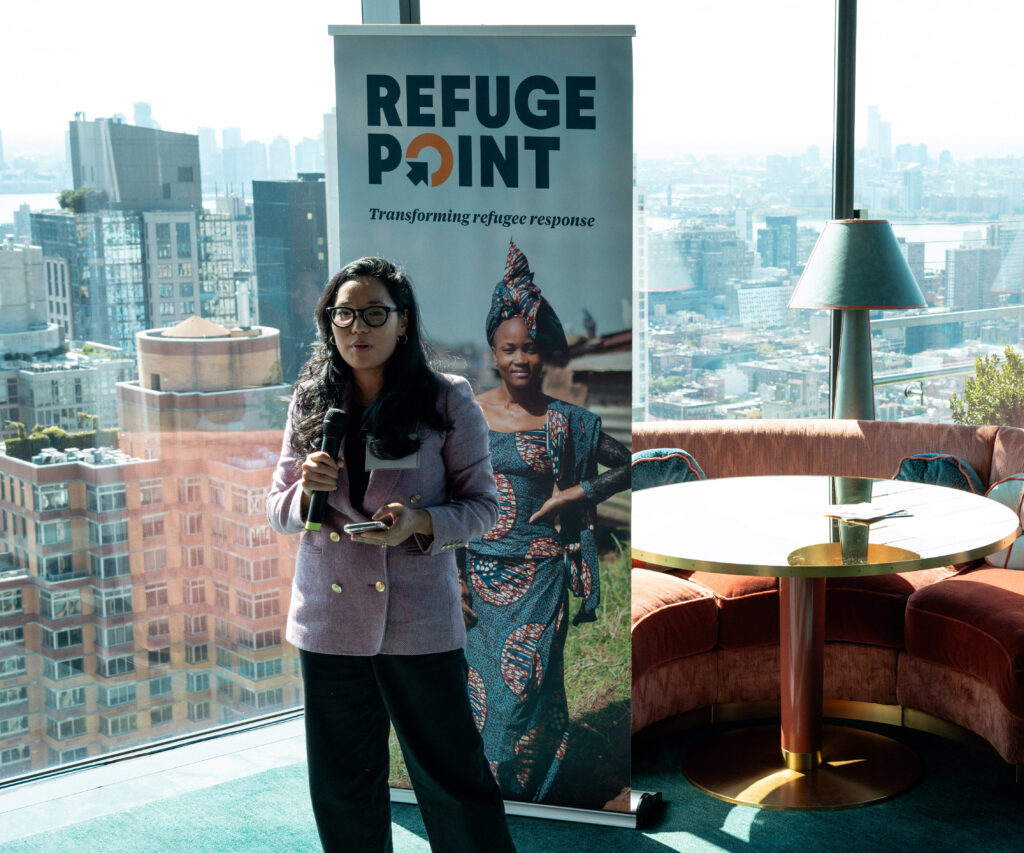 Lina Tori Jan, RefugePoint board member, social entrepreneur, and advocate for equality and human rights, speaking at RefugePoint’s Family Reunification Initiative launch event. Photo: Chris Jensen
Lina Tori Jan, RefugePoint board member, social entrepreneur, and advocate for equality and human rights, speaking at RefugePoint’s Family Reunification Initiative launch event. Photo: Chris Jensen



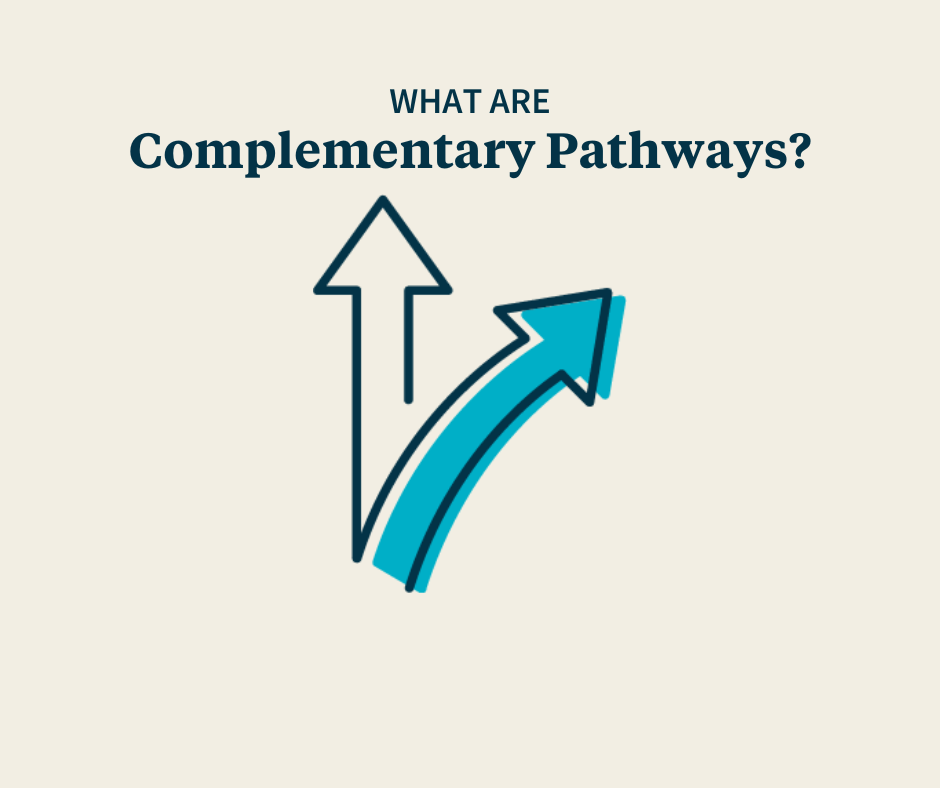
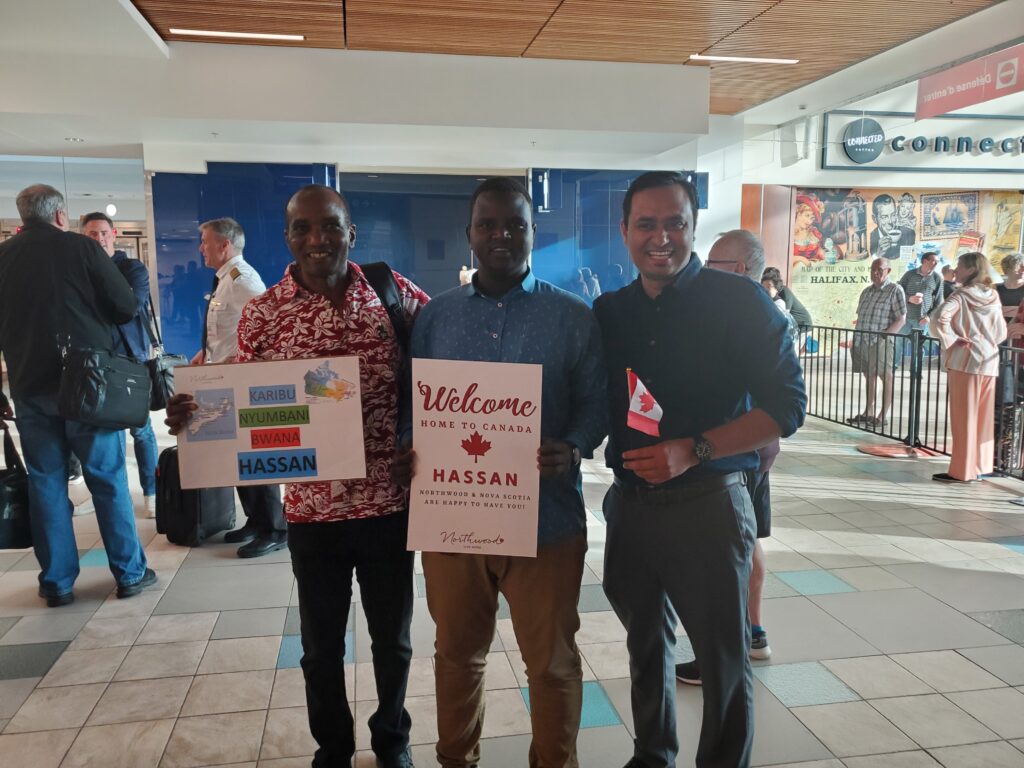 Hassan (center) arrives in Nova Scotia as part of
Hassan (center) arrives in Nova Scotia as part of 